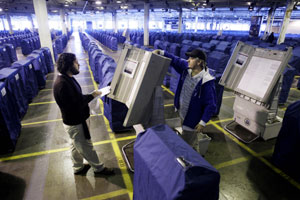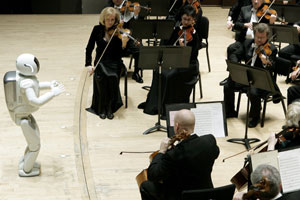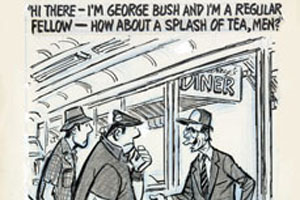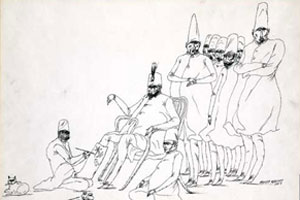Focus on America
Electronic Voting Technology Has Not Won Trust of U.S. Voters

Some U.S. jurisdictions are backing away from using electronic voting systems even as many other democracies are adopting them, panelists at a discussion sponsored by the National Archives said.
But while they decried this development, the panelists also agreed that techniques to assure the integrity of elections must be improved to gain public confidence in the high-tech systems.
Moves to update election systems and procedures gained steam as public trust declined after the presidential election in 2000, when a court fight over alleged voting irregularities in Florida kept the outcome in doubt for more than a month. A Supreme Court ruling ultimately suspended an ongoing recount, leaving George W. Bush with a 537-vote margin in the state, thus giving him a paper-thin 271-267 Electoral College victory.
U.S. presidential elections are run at the state level as essentially 51 different contests, with each jurisdictions setting different rules and using a variety of equipment. The Florida problems included equivocal results in several counties that used punch-card ballots.
“Coming out of the controversies of 2000 was a desire … to ensure that votes are properly cast and accurately reported. It’s absolutely essential to the functioning of a healthy democracy,” Thomas Mann, a senior fellow at the Brookings Institution, said in introducing the October 17 panel session.
Paul DeGregorio, former chairman of the U.S. Election Assistance Commission (EAC), said he is troubled by declining use of innovative systems, even after the spending of “$3 billion of taxpayer money in the last few years on electronic voting.” The EAC, set up in 2002, serves as a national resource for administering federal elections and sets standards for state and local governments.
“I would argue we can trust this technology, and that it’s no less safe than paper ballots or the optical systems,” DeGregorio said.
He proposed voting via the Internet, contending this would be especially helpful for 6 million Americans who live abroad and currently depend on a slow and unreliable mail system. Of 993,000 ballots sent out in the last election, 330,000 ended up being counted, he said. “That’s 5.5 percent of the 6 million being able to participate. … We’re still using the methods that we used in World War I,” DeGregorio said.
In contrast, he said, Australia used online voting in 2007 for troops serving in Iraq and Afghanistan, raising participation by the military from 20 percent to 75 percent “in a very secure manner.” Estonia, the United Kingdom, Switzerland, Canada and the Netherlands also are introducing online voting, and the Philippines and Romania will follow suit in 2009, he said.
DeGregorio quoted the chairman of India’s election commission as recently telling him, “We got rid of paper and pencil, and 600 million Indians voted on electronic devices. … We really didn’t have any problems. I don’t understand why your country is going backwards.”
Using an example closer to home, DeGregorio declared: “When 93 million people can vote in four hours on their favorite American Idol contestant by telephone, I think the younger generation is going to demand from election officials, ‘Why can’t I use that kind of technology to cast my ballot in elections? Why should I have to wait in line for an hour to vote?’”
THE NEED TO BUILD VOTER CONFIDENCE
David Beirne, executive director of the Election Technology Council trade association, argued that “no voting system can be made 100 percent foolproof. … To think that paper is somehow a panacea to concerns about voting integrity is a gross oversimplification of the complexities involved in election administration,” he said.
Beirne endorsed testing procedures and post-election auditing, but stressed that such confidence-building techniques must not violate the intellectual property rights of the software developers.
He later told America.gov he agreed there is a “potential threat” that electronic voting could allow for broader-scale tampering. But, he said, “There’s always been risk with every type of voting system. If an insider to a local election office wants to fix an election, they don’t need to hack a system to do that.”
In a brief interview, Mann cited the very fragmentation of the voting system as something of a mitigating factor against widespread tampering. “Because our system is so decentralized,” he said, tampering typically could not expand beyond the county level.
Patrick Merloe, director of electoral programs for the nonpartisan National Democratic Institute for International Affairs, said the primary issue is not the choice of technology, but whether systems are in place to assure trust.
The problem is “the lack of public confidence in the process, and the only way to establish that confidence is transparency,” he said.
It is essential, Merloe said, that both candidates and the public are brought into the process early enough “to be involved in the design … and that you can say afterward that it’s accurate.”
Roy Saltman, a specialist in voting technology who served for 27 years at the National Bureau of Standards, called for a shift from the current “haphazard system of private parties registering voters” to one involving interstate coordination and a role for the national government.
“In my opinion, we ought to have in every state a nonpartisan or multipartisan body that supervises elections,” Saltman said. “In this I believe the United States is way behind other democratic countries.”
Recently on Focus on America
A Robot Conducts the Detroit Symphony Orchestra
 The ranks of orchestra conductors have included such esteemed figures as composers Hector Berlioz and Leonard Bernstein, opera singer Placido Domingo, and musicians Leonard Slatkin and Mstislav Rostropovich. Now they are joined by Asimo, a humanoid robot.
The ranks of orchestra conductors have included such esteemed figures as composers Hector Berlioz and Leonard Bernstein, opera singer Placido Domingo, and musicians Leonard Slatkin and Mstislav Rostropovich. Now they are joined by Asimo, a humanoid robot.
Political Cartoonist Herblock Skewered the Powerful
 To friends and acquaintances, Herbert L. Block (1909-2001) was an unassuming man with a gentle demeanor, but to U.S. presidents from the 1930s to the 1990s he was a scourge who wielded his wit like a blunt instrument, often at their expense.
To friends and acquaintances, Herbert L. Block (1909-2001) was an unassuming man with a gentle demeanor, but to U.S. presidents from the 1930s to the 1990s he was a scourge who wielded his wit like a blunt instrument, often at their expense.
New York City Museum Exhibits Drawings by Iranian Satirist
 “I do not believe in an ideal society. I do not need an ideal society, either, as there is no need for me in such a society. If someday I feel the need for an ideal society, I will rent one.” -- Ardeshir Mohassess, in conversation with journalist Amir Teheri, 1971
“I do not believe in an ideal society. I do not need an ideal society, either, as there is no need for me in such a society. If someday I feel the need for an ideal society, I will rent one.” -- Ardeshir Mohassess, in conversation with journalist Amir Teheri, 1971